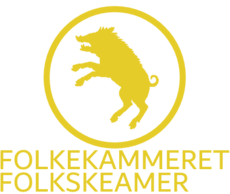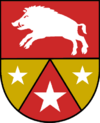Folkekammer
Parliament of Littland | |
|---|---|
 | |
| History | |
| Established | 8 July 1913 |
| Preceded by | Landstinget, Kingdom of Littland |
| Leadership | |
Inger Knudsen, New Center | |
Deputy Speakers | Per Vesterberg, Christian Democratic League |
Kristine Anker, Labour Party | |
Kåre Mikkelsen, Green Future | |
Albert Simonsen, Christian Democratic League | |
| Structure | |
| Seats | 325 |
 | |
Political groups | Government (143)
Supporting (21)
Opposition (161)
|
| Committees |
|
Length of term | 4 years |
| Salary | 30,995 Đ monthly |
| Elections | |
| Closed list proportional representation with a 4% election threshold | |
First election | 1 June 1913 |
Last election | 18 November 2020 |
Next election | On or before 18 November 2024 |
| Meeting place | |
 | |
| Folkekammeret Tinghuset, Kaslund, Littland | |
| Website | |
| www.folkekammeret.li | |
| Constitution | |
| Constitution of Littland | |
 |
|---|
| This article is part of a series on the politics and government of Littland |
|
|
The Folkekammer (Littish: /fol̠kɘkɑm̥ɑ/ , "Peoples Chamber") is the unicameral legislature of the Republic of Littland. The Folkekammer has 325 seats and is elected every four years based on proportional representation. A member of the Folkekammer is known as a Folkekammermedlem, literally "member of the Folkekammer" which is often shortened to simply "MF".
The Folkekammer passes laws, approves the state budget and international treaties, and supervises the activities of the government. A motion of no confidence may force a single minister or the entire government to resign. The President has limited veto-power over legislation, although this can be overruled. The Folkekammer has 19 committees and is led by the Speaker as well as three Deputy Speakers.
History
Number of seats
The number of seats in the Folkekammer has varied over the years. Under the constitution from 1913, the Folkekammer had 225 seats which was increased to 325 with the current constitution from 1986.
Electoral System
The Folkekammers 325 members are elected on the basis of proportional representation. A standard electoral period is four years. Elections have previously taken two days, but they are now conducted during one day. Every Littish citizen who is at least 18 years of age on the date of the election has the right to vote. There is no voter registration in Littland and citizens receive an invitation to their local polling station in the mail. With few exceptions such as judges, active military personnel and the President, any voting age citizen may stand for candidate. All parties already in the Folkekammer are required to nominate candidates. Any party may be on the ballot for the election if they gather the amount of votes needed to get a single seat in the last election, which in 2022 is 40.073 signatures. Individual candidates need to gather half that number, at 20.036 signatures. 26 parties ran in the last election, although only 14 got over 50.000 votes.
Organization
Presidium
| Position | Representative | Party |
|---|---|---|
| Speaker | Inger Knudsen | New Center |
| First Deputy Speaker | Per Vesterberg | Christian Democratic League |
| Second Deputy Speaker | Kristine Anker | Labour Party |
| Third Deputy Speaker | Kåre Mikkelsen | Green Future |
Committees
The Folkekammer has 19 committees. Each committee has permanent members for each term of the Folkekammer. Committees can have three sizes, with 8, 12 and 16 members respectively. On average, every member of parliament is also a member of a committee, with the notable exception of party leaders and members of the Presidium.
| Committee | Members |
|---|---|
| Legal Affairs Committee | 12 |
| Internal Affairs Committee | 16 |
| Foreign Affairs Committee | 16 |
| Employment Committee | 12 |
| Education Committee | 12 |
| Church Committee | 8 |
| Culture Committee | 8 |
| Food and Health Committee | 8 |
| Research and Innovation Committee | 12 |
| Social Affairs Committee | 16 |
| Transport Committee | 12 |
| Business and Trade Committee | 16 |
| Finance and Taxation Committee | 16 |
| Defence Committee | 16 |
| Development and Housing Committee | 8 |
| Enviornment and Climate Committee | 16 |
| Immigration Committee | 8 |
| Energy and Utilities Committee | 12 |
Election results
Composition
Current
| Party | Party leader | Group leader | Seats |
|---|---|---|---|
| KF Christian Democratic League | Albert Simonsen | David Askov | 81 |
| GF Green Future | Lauritz Magnussen | Anton Henriksen | 73 |
| FP Freedom Party | Morten Aadal | Sebastian Anker | 62 |
| AP Labour Party | Sofie Aakjær | Olivia Olsen | 60 |
| Li Liberal Party | Chris Clemensen | Jane Klarup | 19 |
| NC New Center | Birthe Hansen | Henrik Linde | 15 |
| In The Initiative | Hanne Thanning | Inger Harms | 13 |
| O Myltoft Movement | Søren Bødker Jørgensen | 2 | |
Historical
An overview of historical compositions of the Folkekammer, in its current from with 325 members following the 1986 Constitution.
1986 - 1988
| 13 | 43 | 113 | 108 | 48 |
| KP | GF | AP | KF | Li |
1988 - 1991
| 48 | 118 | 103 | 56 |
| GF | AP | KF | Li |
1991 - 1994
| 45 | 95 | 16 | 114 | 55 |
| GF | AP | OM | KF | Li |
1994 - 1998
| 49 | 88 | 14 | 96 | 50 | 28 |
| GF | AP | OM | KF | Li | FP |
1998 - 2002
| 17 | 41 | 99 | 83 | 52 | 33 |
| V | GF | AP | KF | Li | FP |
2002 - 2004
| 53 | 93 | 80 | 51 | 48 |
| GF | AP | KF | Li | FP |
2004 - 2007
| 60 | 105 | 92 | 34 | 34 |
| GF | AP | KF | Li | FP |
2007 - 2008
| 39 | 108 | 19 | 97 | 32 | 30 |
| GF | AP | NC | KF | Li | FP |
2008 - 2012
| 61 | 91 | 22 | 86 | 28 | 37 |
| GF | AP | NC | KF | Li | FP |
2012 - 2016
| 24 | 56 | 84 | 17 | 93 | 21 | 16 | 14 |
| In | GF | AP | NC | KF | Li | FP | RP |
2016 - 2020
| 18 | 59 | 71 | 13 | 92 | 37 | 35 |
| In | GF | AP | NC | KF | Li | FP |
2020 -
| 13 | 73 | 60 | 15 | 81 | 19 | 62 | 2 |
| In | GF | AP | NC | KF | Li | FP | O |
